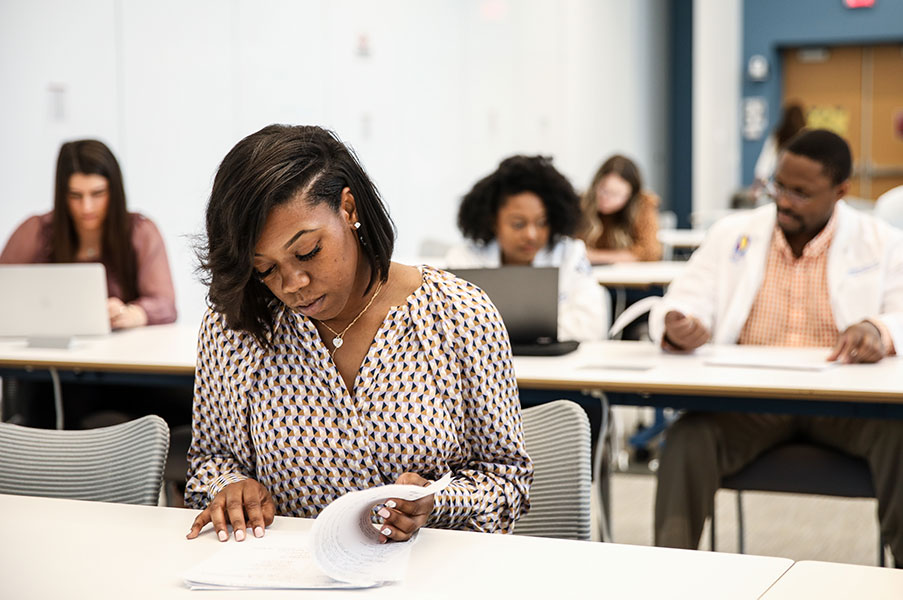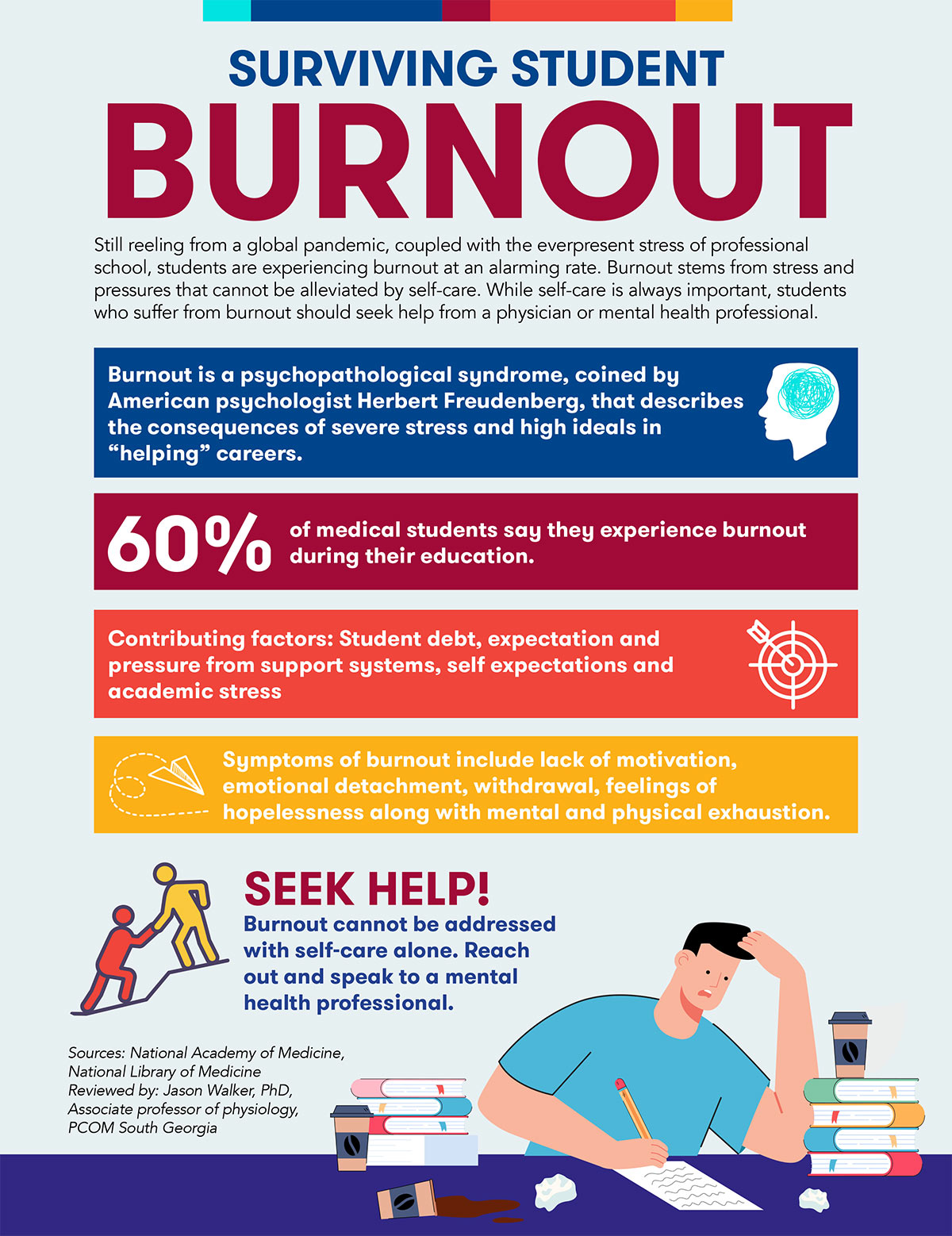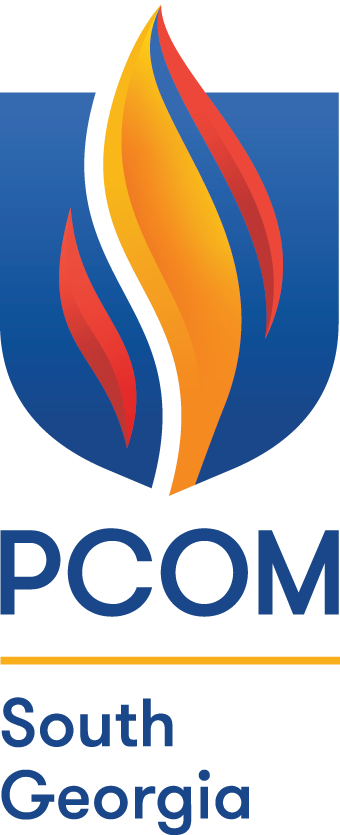Understanding Medical Student Burnout
Causes, Symptoms and How to Recover
August 4, 2022“There’s not a student going through medical school—osteopathic or allopathic—who
won't experience burnout during their tenure as a medical student,” said Jason Walker, PhD, associate professor of physiology at PCOM South Georgia. He has seen first-hand the effect of burnout in medical students during his time
as a professor and as a researcher on the topic.
What is burnout?
Coined by American psychologist Herbert Freudenberg in the 1970s, burnout—a psychopathological
syndrome—is used to describe the consequences of severe stress and high ideals in
“helping” careers. Then, in 2019, the World Health Organization officially classified
burnout as a medical diagnosis.
Why is medical student burnout so high?
Medical professionals fall under that “helping” category with 60-70% of medical students
saying they experience burnout during their education. Dr. Walker likens the educational
experience to drinking water from a firehose.
He said, “During medical school, students are actually drinking water from three fire
hoses at once: the curriculum, their personal life and unexpected life circumstances.”
It's because of those factors that Dr. Walker said burnout reaches its peak at the
end of the second year of medical education when students are preparing for board
exams, then again during the third and fourth years of clerkship rotations.
“The peaks come when students are facing stress, accountability and responsibility
from their preceptors while preparing for upcoming boards and exams,” Dr. Walker said.
Medical students, especially those from underrepresented communities, face an overwhelming
amount of pressure and expectations from themselves, their families and their communities
who want to see them succeed. An additional pressure point comes from the student
debt, which averages around $300,000 for medical education.
He also said that COVID-19 exponentially increased burnout due to the lack of group
settings and in-person socialization.
What is the difference between stress, burnout and depression?
Dr. Walker said that there is a difference between stress and burnout. Oftentimes,
stress and normal fatigue can be solved with self-care—taking a walk outdoors, relaxing
with friends and taking time away from studying to re-energize.
What are student burnout symptoms?
Burnout comes when the fatigue simply extends and cannot be fixed with self-care.
“Burnout is not fixed through self-care because it's not caused by that person,” he
said. “It's caused by outside stressors and extenuating circumstances.”
Symptoms of burnout include lack of motivation, emotional detachment, withdrawal,
feelings of hopelessness along with mental and physical exhaustion. Dr. Walker said
he's personally seen an increase in burnout in medical students, which can easily
lead to depression.
“When someone says, ‘I just don’t want to do this anymore. I dread going to school.
I have insomnia. I can’t study,’ that's when they need to see a mental health counselor.
Truthfully, they need to see one before you even get to this point,” said Dr. Walker.
How to recover from academic burnout
Dr. Walker said the number one thing to do is see a counselor. Then, take time to
meditate, get some physical activity and get away from studying.
Jay S. Feldstein, DO '81, President and CEO of PCOM, said he faced burnout as an emergency room physician.
After nearly 10 years, he knew he had to make a change for his mental health.
“Part of the reason I'm here at PCOM is that I burned out as an emergency room physician,”
he said. “I got to the point where I dreaded going to work. I dreaded seeing patients,
and I didn't want to go to the ER. It's because of that, that I sought out a different
career path. Between shift work, loss of control and pressure, it just became too
much. I am a living example of experiencing a career burnout in emergency medicine.”
Dr. Feldstein is a testament to seeking help for burnout. He said, “Get help early.
Don't be embarrassed. We're all here to support our students and we have a vested
interest in seeing our students succeed. Burnout is reversible and treatable. It's
difficult to get through medical school alone so having a supportive peer group is
crucial.”
PCOM Resources
About PCOM South Georgia
In 2019, Philadelphia College of Osteopathic Medicine (PCOM), a premier osteopathic
medical school established in 1899, extended its commitment to the Southeast by establishing
PCOM South Georgia. An additional teaching location in Moultrie, Georgia, PCOM South Georgia offers both
a full, four-year medical program leading to the Doctor of Osteopathic Medicine (DO)
degree and a Master of Science in Biomedical Sciences. PCOM is a private, not-for-profit
institution that trains professionals in the health and behavioral sciences fields.
Joining PCOM Georgia in Suwanee in helping to meet the healthcare needs of the state, PCOM South Georgia
focuses on educating physicians for the region. For more information, visit pcom.edu or call 229-668-3110.
Contact Us
For general media inquiries, please contact the Office of Marketing and Communications
at 215-871-6300 or communications@pcom.edu. Visit our media relations page to view contact information for public relations personnel.
Connect with PCOM South Georgia

 Why is medical student burnout so high?
Why is medical student burnout so high?
